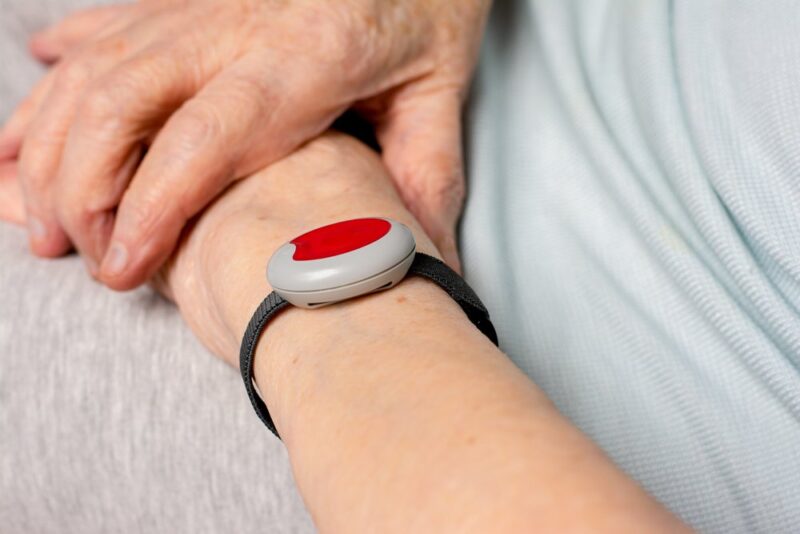We’ve all seen the commercial featuring an elderly woman on the floor shouting, “I’ve fallen, and I can’t get up!” That was an ad for Life Alert, one of the first medical alert systems to offer emergency response for seniors so they could continue living safely in their own homes. Since that commercial was released, nearly two decades ago, many other companies have developed medical alert systems— each with their own bells and whistles that promise peace of mind.
As a child of aging parents, I wanted to gain some knowledge about these systems to know which one to recommend when they’re ready for it. I consulted with Stacey Zerban, an administrator at the Friendship Village Senior Living in St. Louis, Missouri to determine what to look for.
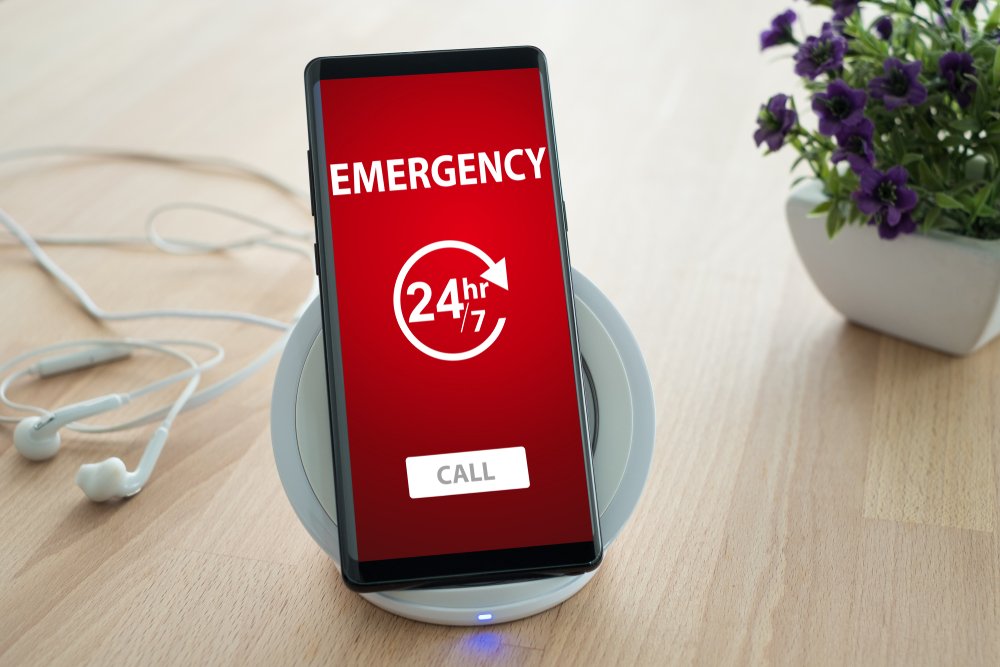
What Is A Medical Alert System?
A medical alert system is a device that sends notifications to emergency responders or family members when a patient can’t reach the phone. The main components include the base which has a large help button and a wearable button that is usually worn on a neck pendant or wristband. If the patient falls or has a medical scare, they can simply push that button and be connected to a call center who will then contact family members or emergency responders.
Since every senior has different needs, it’s impossible to say which one system is best. Some brands offer cellular based service for seniors who don’t have landlines, some provide multilingual emergency responders, some have automatic fall detection for patients who are likely to faint, and so on. The most important thing to remember is that a medical alert system is not just a product— it’s a life-saving service for your loved one.
Who Can Benefit from a Medical Alert System?
Medical alert systems were developed to allow those at risk of injury to continue living independently. Your loved one may benefit if they:
-
Have recently been released to home care after surgery and rehabilitation
-
Have balance problems that make one prone to falling or tripping
-
Have a blood sugar disorder that makes one likely to faint
-
Have breathing problems such as COPD and asthma
-
Have high blood pressure and heart problems
-
Are taking medications that cause drowsiness or dizziness
“For a parent who is fairly independent and wants to stay in their own home, a medical alert system can give them peace of mind that in an emergency, help will come,” said Zerban.
However, Zerban notes that a medical alert system should never be a replacement for personal help if it’s needed, so if your loved one has trouble getting out of bed, bathing, and getting dressed; you may want to consider private duty home care. And if you are truly worried about the risk of falling, then you need to assess how safe they are living alone at home.

What To Consider When Choosing a Medical Alert System
Everyone’s needs are different, but there are some important things to keep in mind when selecting the best system for the senior in your life.
Comfort. Since medical alert pendants are usually worn as a necklace or bracelet, they need to be comfortable, or there’s a chance your loved one won’t wear it. You also need to consider whether they will remember to put it on.
Cost. Since Medicare does not usually pay for medical alert systems, you must decide how much you or your loved one are willing to spend out of pocket. Most brands offer discounts for signing a yearly contract, and some offer discounts for AARP members. Fees will change based on the system’s capabilities, so be sure that you know what’s included in the price you’re quoted.
Range. From the base of the system, some brands have ranges of just 100 feet while some extend beyond 1,000 feet. You’ll want to take into account whether your loved one stays fairly close to the room where the base is or if they spend time on a different floor of the house. It’s important that if your loved one falls in the basement or out in the garden, a call for help will go through. A longer range may be a better choice for seniors with large homes or who like to spend time outside.
Response Time. Peace of mind is the main purpose of a medical alert system, so you will want to know how quickly help will come if your loved one needs it. Typically, a call center should respond between 20 and 60 seconds so that help can be there right away.
“When our residents hit their alert button, someone in our call center answers immediately,” said Zerban. “Once we assess the situation, a responder is usually at their door within two to five minutes. Your loved one should be able to get that type of assistance at home if they need it.”
Fall Detection. Diabetics at risk of fainting, patients at risk of stroke or heart attack, or those with epilepsy may be too incoherent to push a button in an emergency. Some medical alert systems can tell the difference between a fall and everyday movement, and they will notify responders automatically if your loved one takes a tumble.
“Fall detection is an important feature because chances are they won’t be able to push that button for help,” said Zerban. “But if you are really worried that your loved one is going to fall, that’s a sign that they shouldn’t be living on their own.”
Battery Life and Backup. You’ll want to know how long the battery in the pendant will work and whether or not the base will still work in a power outage.
Phone Service. Traditional medical alert systems send emergency notifications through a landline, so if your loved one doesn’t have a home phone, you’ll need to look for a system that operates on a cellular network. Zerban stated that most of her private duty and home health care patients still have landlines.
GPS Capability. Activeolder adults can benefit from a medical alert system with GPS. If they fall or have an emergency away from home, all they have to do is press a button and the GPS signal will help responders find their exact location.
An Overview Of 6 Popular Medical Alert Systems
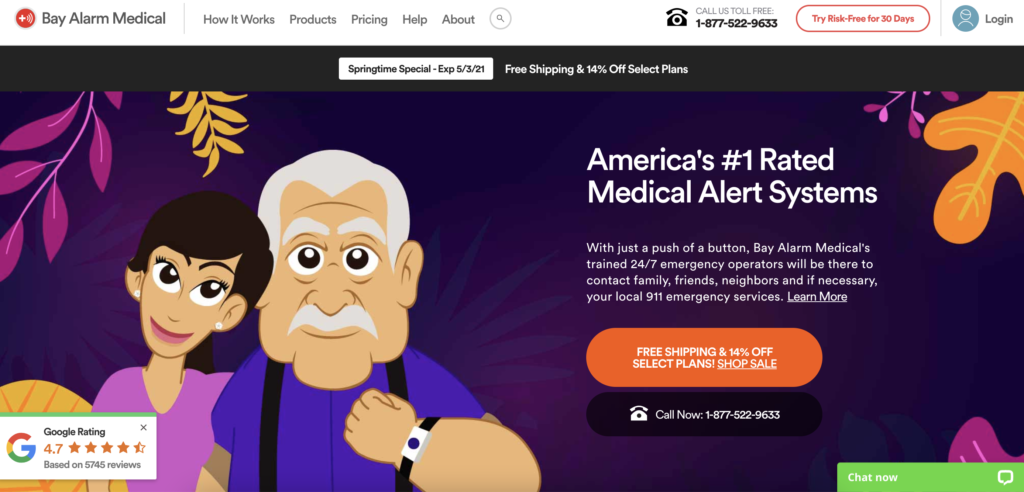
Bay Alarm
After testing various medical alert systems for the fastest response time and best range, PC Magazine chose Bay Alarm’s in-home system as their top Editor’s Choice. Safehome.org also chose Bay Alarm as the Best Overall System, stating that “their cellular system with GPS is the best on the market and they’re the only company offering an in-car monitoring solution.” One big perk is that if you purchase an extra pendant for a spouse, Bay Alarm will monitor it for free. There are five options to choose from:
-
In-Home Medical Alert. The base is compatible with a landline, VoIP, and cable service providers, or you can order an AT&T cellular option for an extra fee. It comes with a waterproof bracelet or necklace and has a range of 1,000 feet. You also have the option of purchasing additional wall buttons for high-risk locations such as the shower. $19.95 per month.
-
In-Home with Fall Detection. For an additional $10 per month, customers will receive a pendant that has automatic fall detection.
-
GPS Help Button. This can be carried while out and about to provide pinpoint location accuracy. $99 equipment purchase; $24.95 per month monitoring.
-
Splitsecnd Mobile. With real-time vehicle monitoring, trip history, and automatic crash detection, you can rest easy knowing that if your loved one has a medical emergency while driving, help will come. No equipment cost, and $24.95 per month monitoring.
-
SOS Smartwatch. Similar to an Apple Watch, this portable device fits around the wrist and works inside the home and on the go, and runs on cellular service. If there is an emergency, your loved one just has to push the button on the watch and will be connected to a call center. $179 purchase; $24.95 per month monitoring.
Comfort: The in-home system comes with either a neck pendant or bracelet.
Cost: No activation or equipment costs; base package starts at $19.95 per month.
Range: 1,000-foot radius
Response Time: 15-20 seconds
Fall Detection: Yes; $10 extra per month
Battery: Five year battery life for in-home buttons and 32 hour battery backup.
Phone Service: The in-home system can be used on landline or cellular.
GPS Capability: Yes, if you purchase the GPS Help Button.
My Rating: 9/10
I love the 1,000 foot radius, which is big enough to keep my parents safe even in their large backyard. With the ability to work on a cellular network, the option of adding fall protection, and a really affordable monthly monitoring cost; there’s hard to find anything wrong with this brand.
Expert Rating: 9/10
Zerban stated, “This seems like an affordable option and offers agood range to encourage them to stay active— as long as they remember to wear their pendant. I would definitely add fall protection.”
Total: 18/20
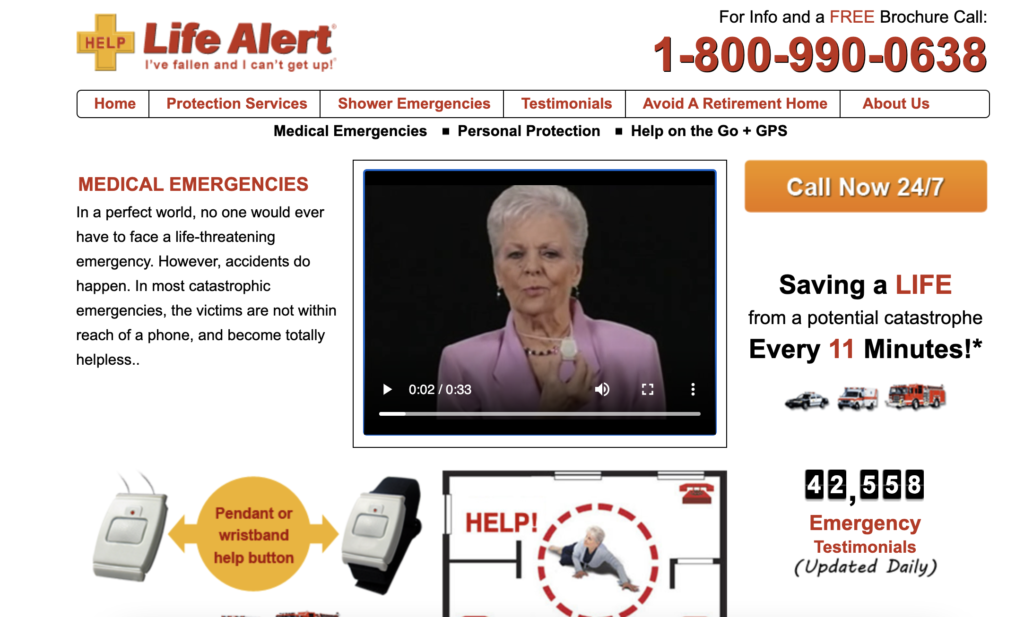
Life Alert
According to their website, Life Alert service saves one person from potential life-threatening dangers every 11 minutes, and they’ve collected over 42,000 testimonials to prove it. However, besides touting that their batteries never need replacing and that help comes “immediately” when called, their website is very limited on specific information. We had to rely on credible sources including Consumer Reports in order to do this review. Life Alert offers four different products:
-
In-Home System: This system comes with a base unit and a wearable help button, and customers can choose to use a landline or cellular service for $49 per month.
-
In-Home System with HELP Button: This works the same as the In-Home System, but it includes a waterproof HELP Button for a total of $69 per month.
-
In-Home, HELP Button, and Life Alert Mobile: For $89.95/month, customers receive the base, wearable device, waterproof HELP Button, and mobile service. As long as customers have cellular service, they can press an emergency button when away from home and it will alert responders and show them the exact GPS location. If customers don’t have a wireless plan but have a basic cell phone, they’ll receive a telephone number to pre-program into the cell phone’s speed-dial to connect directly to their medical alert monitoring center.
Comfort: Customers receive both a neck pendant and a bracelet.
Cost: A one-time setup fee starts at $96; plans start at $49 per month.
Range: Up to 800 feet radius
Response Time: I could not find any info on response time.
Fall Detection: Life Alert does not have a fall detection option.
Battery: Batteries last up to 10 years, so they never need recharging; 72-hour base battery backup.
Phone Service: Can be used on landline or cellular.
GPS Capability: Yes, on the mobile plan.
My Rating: 6/10
It’s nice that Life Alert offers service for landline and cellular customers, but I don’t see why customers would pay twice the monthly cost of other medical alert systems. And surprisingly, for a company whose slogan has been based on a woman falling, there’s no option to add “fall detection.”
Expert Rating: 5/10
Zerban stated, “It’s more expensive, and there’s no way to know if your loved one has fallen.”
Total: 11/20
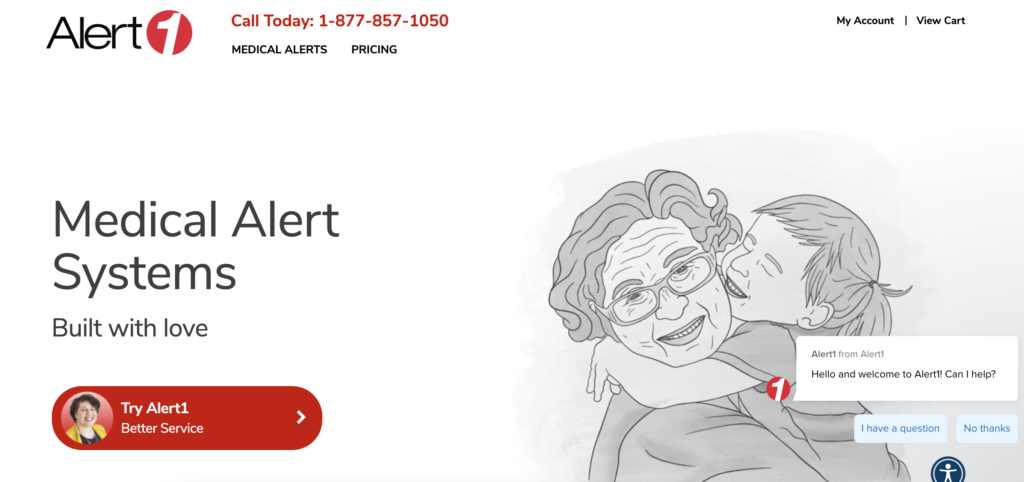
Alert1
One nice thing about Alert1 is that they can support customers in 190 languages. They also allow the person in distress to choose whether to contact family members or emergency services. There are five Alert1 options, including:
-
Home Medical Alert: This traditional system uses a landline telephone, VOIP, or DSL. In an emergency, seniors simply press the red button on the pendant to connect to an operator and then decide whether to contact a family member or emergency responders. $19.95 per month on the annual plan.
-
Home + Fall Detection: This system offers the same features as the traditional medical alert system, but has a separate fall detection pendant as well for $36.96 per month.
-
Kelsi On-the-Go: While away from home, customers who have AT&T or Verizon cellular service in the area can wear a pendant with a two-way talk feature that allows them to communicate with the call center. $30.95 per month on the annual plan.
-
Kelsi Pro On-the-Go + Fall Detection: This service requires WiFi and AT&T or Verizon cell service. Whether your loved one is in or out of the home, the pendant can automatically detect a fall, call for help, and locate them using GPS. The pendant also has two-way talk capabilities, all for $46.95 per month on the annual plan.
-
PAX Plus Home + Mobile + Fall Detection: This system offers peace of mind whether at home or away. It can operate either on a landline or cellular service, and comes with the home base as well as a mobile pendant with fall detection. The mobile pendant also has GPS all for $52.95 per month on the annual plan.
Comfort: The home plan offers either a necklace or bracelet.
Cost: $50 activation fee, and plans range from $19.95 per month to $52.95 per month.
Range: Up to 600-foot radius
Response Time: 45 seconds
Fall Detection: Yes, if purchased as a package.
Phone Service: Home service requires a landline while Kelsi service works on Verizon or AT&T network.
GPS Capability: Yes, on mobile plans.
My Rating: 8/10
The fact that the basic home Alert1 system requires a landline may be a turnoff for some, but Zerban said that most seniors keep their landlines, so that shouldn’t be an issue. I also love that fall detection is available, and that the company offers so many options for keeping my loved ones safe when away from home.
Expert Rating: 10/10
Zerban claimed, “If I were buying this for my dad, I would choose the PAX Plus Home + Mobile + Fall Detection for one bundled price, since it brings peace of mind whether at home or away.”
Total: 18/20

Philips Lifeline
With over 7 million subscribers, Philips Lifeline has the largest medical alert company in the United States. The range of the home system is only 100-200 feet, which is less than other brands, but it does offer on-the-go options. Philips offers a free Philips Cares app with every plan, which allows family members to check their loved ones’ stats such as mood, diet, mobility, memory, social interaction, and also receive medical alerts. The following three Philips Lifeline plans are available:
-
HomeSafe Standard: The in-home medical alert system can run on either a landline or cellular service. There is a two-way response base, and the waterproof pendant can be used in the shower. It’s up to the customer whether the call center contacts a family member, close friend, or emergency services. $29.95 per month.
-
HomeSafe with AutoAlert (Fall Detection): This has all the same features as the standard model but comes with an AutoAlert pendant that detects falls. $44.95 per month.
-
GoSafe2: This single piece system doesn’t require a base station but must have good coverage by AT&T’s wireless network to function properly. It’s simply worn around the neck and has two-way voice, GPS, and fall detection. $49.95 per month.
Comfort: Customers can choose either a neck pendant or bracelet.
Cost: $50 activation fee (sometimes waived), and home plan starts at $29.95 per month.
Range: 100-200 feet for the HomeSafe Standard system.
Response Time: Approximately 30 seconds.
Fall Detection: Yes, with HomeSafe with AutoAlert and GoSafe2 options.
Battery: The pendant battery lasts 18 months while the base has 30 hours of battery backup.
Phone Service: The system can operate on a landline or cellular service.
GPS Capability: Yes, with GoSafe2.
My Rating: 7/10
The range isn’t as far as other systems, but if the senior in your life doesn’t have a large home, it might be far enough. The fast response time is reassuring, and the Philips Cares app is great for offering family members peace of mind from afar.
Expert Rating: 6/10
“It’s not a very large range, and if your loved one isn’t mobile enough to move around 100 feet inside the home, it may be time to get them consistent personal help. I also feel like the Cares app sounds like it’s trying to replace personal interaction. I don’t need an app to tell me if my dad is happy or sad; I talk to him on the phone every day.”
Total: 13/20
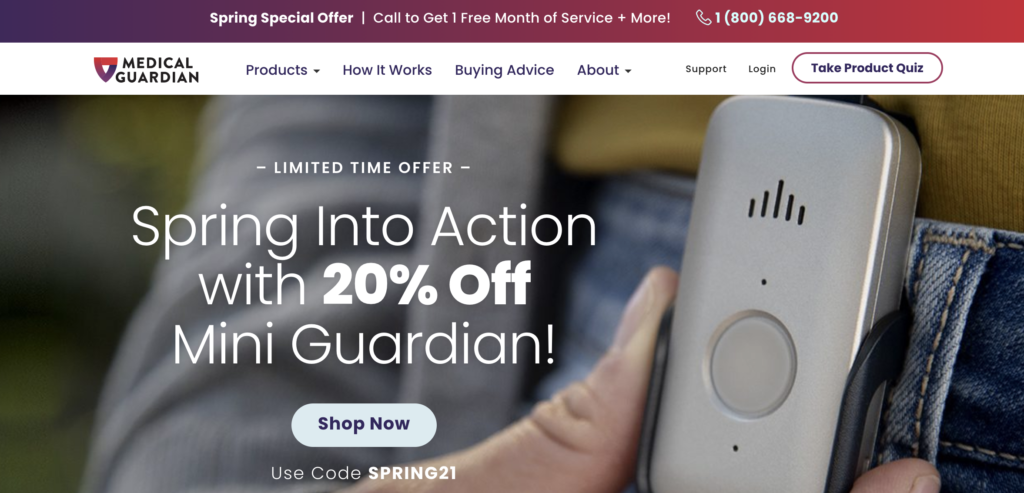
Medical Guardian
With a range as far as four football fields, on-the-go options, and no equipment fees; Medical Guardian seems to be a great option for active seniors. They offer five options:
-
Classic Guardian. This in-home system offers a button that can be worn around the neck or wrist. It requires a landline, but with an impressive range of 1,300 feet, your loved one will be safe working in the yard and even visiting neighbors. $30 per month.
-
Home Guardian. This in-home system runs on cellular service and has a range of 600 feet. The cost is $35 per month, and you can add fall detection to your wearable device for $10 extra per month.
-
Freedom Guardian. This all-in-one smartwatch has an integrated mobile app and two-way messaging for protection on the go. After paying the $299 device fee, you’ll get location tracking, caregiver monitoring, and medication reminders through a smartphone app for $44.95 per month.
-
Active Guardian. Your loved one can stay active both inside and outside with this all-in-one medical alert system that has GPS, WiFi, and optional fall detection capabilities. $45 per month
-
Mini Guardian. At half the width and weight of the Active Guardian, this petite device is so small it can be clipped on— making it easy to take along whether traveling far or taking a walk around the block. $40 per month.
Comfort: Available as a neck pendant or bracelet.
Cost: No activation or equipment fee, and home plan starts at $30 per month.
Range: 1,300 feet with landline connection; 600 feet with cellular.
Response Time: Approx 30-45 seconds.
Fall Detection: Yes, with Home Guardian.
Battery: The wearable button battery lasts three to five years, while the base has 32 hours of backup.
Phone Service: Can use landline or AT&T cellular service.
GPS Capability: Yes, with Active and Mini Guardian.
My Rating: 10/10
For the price, the range of the in-home systems seems incredible. I also love that they offer so many options for seniors who have an active and social lifestyle, since research shows that older adults who stay active gain strength to live independently longer.
Expert Rating: 10/10
Zerban claimed, “Staying active and social is so important for seniors, and this product seems to encourage that.”
Total: 20/20
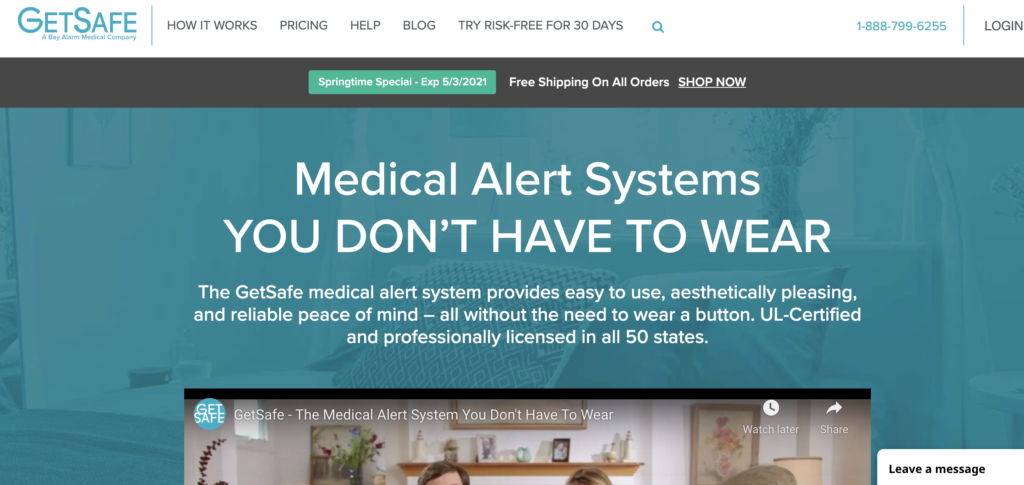
GetSafe
If your loved one refuses to wear a button around their neck or wrist, then GetSafe may be the answer. While a wearable device is available, the system works using only a base station and wall buttons with two-way communication. Customers select the number of buttons needed to accommodate the size of their home and place the buttons in high-risk areas such as bathrooms and stairways. If help is needed, they simply need to say “Call 911” twice, and a call center will contact family members before contacting emergency services.
-
The Starter Package. Best for a one-bedroom home, this system includes the base unit, one voice-activated wall button, and one standard wall button. $79 equipment, then $24.95 per month.
-
The Standard Package. Best for two or three bedrooms and includes the base unit, two voice-activated wall buttons, and three standard wall buttons. $149 equipment, then $24.95 per month.
-
The Select Package. If your loved one has four or five bedrooms, he’ll need this package which includes the base, three voice-activated buttons, five standard wall buttons, and a lockbox for emergency personnel access. $229 equipment, then $24.95 per month.
Comfort: There’s nothing to wear unless your loved one prefers to wear a necklace or bracelet.
Cost: $79 to $229 Initial equipment, then $24.95 per month.
Range: 1,300 feet
Response Time: 30-60 seconds
Fall Detection: Available with the purchase of Mobile GPS Help Button (see GPS Capability)
Battery: The pendant battery lasts 18 months, while the base has 30 hours of battery backup.
Phone Service: Includes AT&T 4G LTE cellular coverage, so there’s no landline needed.
GPS Capability: Customers can purchase a Mobile GPS Help Button for $30 per month, and pay an additional $5 per month for a caregiver GPS tracking app. The GPS button has up to 120 hours of battery life.
My Rating: 9/10
The initial cost of the equipment seems expensive, but I can see where this would be a great option for seniors who don’t like to wear bulky pendants or bracelets, or who forget to put wearable buttons back on after sleeping. Once you add the GPS Help Button and fall detection, there’s not much left to worry about when it comes to your loved one’s safety.
Expert Rating: 8/10
“I like that this system doesn’t have to be worn since so many of our patients need to be reminded to put their pendant on, and men especially don’t like to wear something around their neck or wrist. But the initial equipment cost might be a turnoff to those on a budget,” stated Zerban.
Total: 19/20
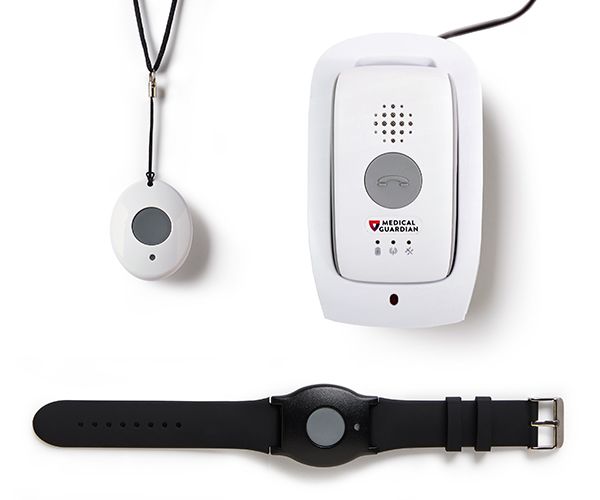
Which Medical Alert System Would I Choose?
After doing research and talking with an expert, I plan to recommend the Medical Guardian System to my parents. It’s affordable since there are no equipment or activation fees, it’s 1,300-foot range would allow my dad to continue staying active in his acre-large yard, and it has optional fall detection which is important for my mom’s balance issues.
